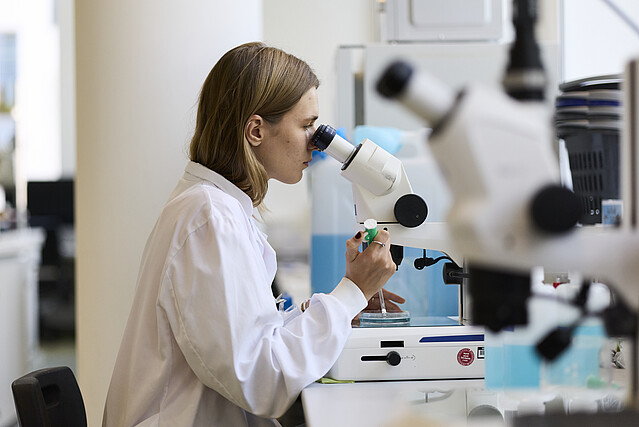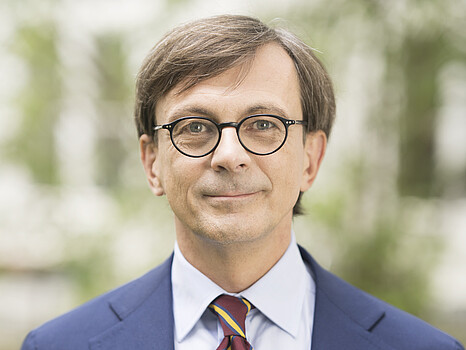Q&A with the WWTF: How Vienna supports excellent research
October 29, 2025|NH
A raft of new opportunities has opened for English-speaking scientific researchers in Vienna. We spoke to the head of the Vienna Science and Technology Fund to learn more.
The Austrian capital has flung open its doors to international researchers – efforts now bolstered with additional funding opportunities from the City of Vienna and associated research institutes. These initiatives add to Vienna’s appeal as an innovation hotspot, in fields ranging from environmental and life sciences to AI and quantum physics. Cutting-edge research, in turn, is good for business: Spin-offs from excellent universities and institutions benefit from a dense early-stage startup funding and incubation network. This support helps researchers turn promising discoveries into exit- or market-ready products and processes.
ViennaBusiness interviewed Dr. Michael Stampfer, Director of the Vienna Science and Technology Fund (WWTF), to learn more about Vienna’s new programme and opportunities for international researchers.
1. Please tell us a little bit about the Vienna Science and Technology Fund (WWTF).
The Vienna Science and Technology Fund (WWTF) was founded in 2001 by the City of Vienna as a non-profit funding organisation for science that will make the world a better place. Our mission is to support cutting-edge research by providing substantial funding for excellent research projects, which we do through calls to researchers who are then homed at Vienna’s many top-notch universities, including the University of Vienna, TU Wien, BOKU University, the Medical University of Vienna, WU Wien, VetMed Uni, and others.
Our primary instrument is thematic funding via well-defined fellowship and grant programmes. These contribute to scientific excellence, foster interdisciplinarity, and allow for key research fields to develop critical mass – which means they can break through the lab doors, so to speak, and provide real contributions to society and the economy.
As we learned through our recent external evaluation, excellence and relevance can be achieved simultaneously. On the one hand, our work is characterised by our rigorous and competitive selection processes. On the other hand, we focus on essential research topics such as life sciences, information and communication technology, environmental systems research, and digital humanism.
In a nutshell, we love scientists and design our calls specifically for our communities, providing them with resources and networks to help them work on groundbreaking ideas. This supports Vienna’s growing strength as a hub for scientific research as well as its researchers’ ability to have an international impact.
2. What is the Vienna Research Groups for Young Investigators programme?
Since 2010, the “Vienna Research Groups for Young Investigators” (VRG) funding programme’s objective has been to attract excellent researchers in their early post-doc phase to Vienna. Funded scientists are provided with substantial resources to establish their own research group and move their career forward on a tenure track position. Funding for each group goes up to €1.8 million for a period of 6 to 8 years. The most important selection criteria are scientific excellence of the applicant as well as innovative strength and quality of the proposed research project. VRG calls are issued annually, with final decisions taken by October of each year, and the main topics vary within WWTF’s focus areas. The programme is designed to provide a clear career path with a long-term perspective for researchers to continue their work in Vienna – creating a “brain gain” for us here.
Since 2010, around 40 outstanding group leaders have been attracted and have significantly contributed to the renewal of the Viennese research landscape with nearly €60 million.
In October 2025, we are rolling out our new Vienna Research Groups Call on Environmental Systems Research. Applicants should focus on addressing fundamental and interdisciplinary research questions in environmental research through cutting-edge methodologies. There will be three positions available, selected by an international expert panel and then implemented by partnering universities, which will become the researchers’ new employers. The quality of applications has historically been really high, and it’s always exciting to get a glimpse at topics like this and research that could positively affect the future. These scientists’ breakthroughs may one day help ensure that human existence is comfortable, sustainable, and respectful of our shared and deeply connected planet in the future, all at the same time – and that’s an exciting thought!
3. What other current funding opportunities are available through the WWTF?
2026 will also be very exciting for us in terms of project calls. We are now starting generous funding activities including “Targeted Prevention in Health”, a new “Resilience and Crisis” call in the social sciences, and an interdisciplinary programme around “Digital Humanism”. Digital humanism is an approach to technological development that keeps human well-being at the center of progress, which differs from a purely market-driven perspectivein that long-term benefits and risks are considered: technology should work for us, and not we for it. Vienna is committed to supporting this human-centric approach in its digitalisation agenda. At WWTF, we plan to bring together computer sciences with social sciences and humanities to address the big questions of our future in the digital world – and not a moment too soon.
4. If I’m an international post-doc looking for my next move, what would draw me to Vienna?
Vienna's scientific landscape is as dynamic as it is diverse, which makes it a very attractive destination for international researchers. Home to leading universities and research institutions, the city provides outstanding facilities and funding opportunities in various fields, including life sciences, ICT, climate research, or the humanities. Its consistently exceptional quality of life, affordable living costs and favorable location in central Europe make it not only highly accessible, but also a great place for families. What’s more, the international community and research environment that operates comfortably in English make it easy for scientists from around the world to connect, collaborate, and feel at home.
With a new legal framework, Austria is strengthening its appeal to international scientific talent from the US and beyond. A central element is the “Settlement Permit – Researcher” (Niederlassungsbewilligung – Forscher), designed specifically for scientists holding a hosting agreement with a certified research institution. In addition, highly qualified researchers relocating to Austria can benefit from substantial tax incentives during their first years in the country.
The 2025 amendment to the Opportunity Hiring legislation will further expand universities’ ability to recruit international scientists quickly and efficiently, reinforcing Austria’s commitment to being a welcoming, globally competitive research destination.
5. Where can I learn more about opportunities in Vienna?
Vienna offers a rich ecosystem for research careers, with opportunities across universities, research institutes, and industry. Researchers can benefit from financial support, structured development paths, channels for international cooperation, and comprehensive integration services – available to everyone from PhD students to senior scientists.
Different funding programmes are available for international researchers, depending on the applicants’ career stage and country of origin, including WWTF’s “Vienna Research Groups for Young Investigators”. Further opportunities are provided by the Austrian Science Fund (FWF), the Austrian Academy of Sciences (OeAW), or Austria's Agency for Education and Internationalisation (OeAD). Individual institutions also offer specific initiatives: for example, Vienna Center for Advanced Studies (ViCAS)at the University of Vienna will award up to ten Senior Fellowships and ten Early-Career Fellowships to outstanding international scholars from all academic fields in 2026.
For further information, universities and other institutions maintain their own career portals, while initiatives such as the Austria Network EURAXESS support incoming researchers in settling and networking in Austria. The website of Euraxess also has a jobs and funding portal for international researchers interested in Austria. The Vienna Business Agency provides advisory services for international scientists and skilled workers, and WWTF also offers dual-career support.
Vienna is home to major universities including the University of Vienna, TU Wien, Medical University of Vienna, BOKU University, University of Veterinary Medicine, and the Vienna University of Economics and Business (WU Wien). Prominent non-university institutes include the Vienna BioCenter (with several member institutes), the research institutes of the OeAW, AIT Austrian Institute of Technology, Ludwig Boltzmann Gesellschaft, and – just outside Vienna – ISTA in Klosterneuburg.


